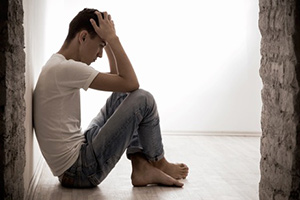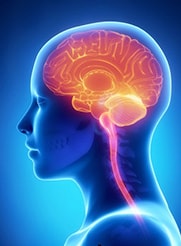Negative Symptoms of Schizophrenia: Understanding Them
What are Negative Symptoms of Schizophrenia?
Nowadays we tend to think of schizophrenia as having two types of symptoms that we call positive and negative. The concept of positive and negative symptoms of mental health has been around for a long time but was first applied to schizophrenia in the 1970’s.
The positive symptoms are so called because they are thinking or behaviour that the person with schizophrenia did not have before they became ill and so can be thought of as being added to their psyche. Positive symptoms include hallucinations such as hearing voices and delusions such as paranoid thoughts.1
Negative symptoms are so called because they describe thoughts or behaviour that the person used to have before they became ill but now no longer have or have to a lesser extent and so have been lost or taken away from their psyche. It describes normal aspects of the person’s behaviour that they no longer have. Negative symptoms can include lethargy and apathy.1
In the past different terminology has been used. People experiencing prominently positive symptoms were described as acute or having Type 1 schizophrenia whilst those experiencing negative symptoms were thought of as having chronic or Type 2 schizophrenia.2 Nowadays the terms positive and negative tend to be used more.
Schizophrenia affects different sufferers in different ways and there is great variability in the way that the negative symptoms manifest themselves. For instance for some people negative symptoms may appear at the outset and be the first indication that anything is wrong. Other people may experience positive symptoms initially and only suffer with the negative symptoms later on. Similarly for some people the positive symptoms may dominate whereas in others it may the negative symptoms that will be more prevalent.3
There are eight principal negative symptoms. These are 3,4,5:
1. Apathy
The person may have a lack of interest in activities that previously were important to them such as their work or studies or recreational activities such as sports. They may also stop looking after themselves properly and their personal hygiene and appearance may suffer noticeably. They may be reluctant to leave the house or even their bedroom and may lie in bed for the larger part of the day.
2. Absent, blunted or incongruous emotional responses
People with schizophrenia experiencing negative symptoms may appear to display no reaction to good or bad news or to react inappropriately for instance laughing at sad news or appearing to become unhappy when hearing good news.
3. Reductions in speech
People with negative symptoms of schizophrenia may appear to have little interest in conversation and may give only very brief responses to questions. Their speech may be disrupted or there may be long pauses in the flow of their speech or in responding to conversation (known as poverty of speech). The ability to make small talk is often completely lost and this loss of vital communication skills can impact seriously on the person’s ability to take part in social activities or find employment7. This is also called alogia by doctors. In extreme cases the person may become completely mute.
4. Social withdrawal
The person may shun social contact and may prefer to spend the larger part of the day and night by themselves. There is a general lack of will to interact with the world around them. This is called avolition by doctors
5. Impaired attention
There may be an obvious difficulty in concentrating during conversation and an inability to concentrate on even simple tasks.
6. Anhedonia
This describes an inability to experience pleasure. People with schizophrenia who experience this often describe life as being grey or empty, devoid of the normal emotional ups and downs that we all take for granted7. Others have described it as feeling empty or hollow10.
7. Sexual problems
There may be a significant reduction or total absence of libido (sex drive), men may experience problems in achieving erections and both men and women may have problems achieving an orgasm (anorgasmia).
8. Lethargy
People with schizophrenia experiencing negative symptoms will often have a profound lack of energy and find it difficult to do any more than light activity. This may lead to them spending a large part of the day in bed or watching television.
Can apparent negative symptoms have other causes?
Sometimes behaviour can be identified as negative symptoms which is actually being caused by positive symptoms such as delusions or hallucinations. For instance one person who experienced severe positive symptoms was instructed by his delusions not to use the pronoun “I” in his conversations with others. This led to noticeable changes in his speech including long pauses and slow reactions to other people. Although it appeared on the surface to be a negative symptom, in fact it was caused by positive ones5.
Why are negative symptoms important?
Negative symptoms are a less well known aspect of schizophrenia than the positive symptoms. Stories about disturbed behaviour appear in the news media quite frequently and there is a generally high level of awareness in the general public about the hallucinations and delusions that schizophrenia causes. But the negative symptoms are less disruptive to those close to people living with schizophrenia and to society in general. They are very much less likely to result in the person’s hospitalisation or to the person coming into contact with the criminal justice system8.
Few people understand that schizophrenia can often cause the negative symptoms and even fewer understand just how disabling the negative symptoms can be. Negative symptoms impact greatly on a person’s quality of life and affect their ability to experience many of the life-fulfilling activities that we take for granted such as employment, long term relationships and financial stability. Although the positive symptoms may lead to more dramatic effects people with schizophrenia often observe that it is the negative symptoms that are most difficult to cope with because of the affect they have on their ability to lead a full life6 and a large amount of research, particularly in the US has borne this out 18.

Unfortunately modern antipsychotics are not very effective at relieving negative symptoms like apathy and social withdrawal. (Image: images.etc/Shutterstock)
Negative symptoms are also important because they are much more difficult to treat than the positive ones3. Modern antipsychotic medicines are very effective in treating positive symptoms and allied with talking therapy can often bring substantial and sometimes total relief from hallucinations and delusions. However a similarly effective treatment for negative symptoms still remains beyond our grasp. When the new generation of atypical antipsychotics was first introduced in the 1980’s there was some evidence that they also had a beneficial effect on the negative symptoms however the early optimism on this issue has subsided to an extent and it is no longer as clear that the atypicals are any better at controlling negative symptoms than the earlier drugs15.
In addition, where negative symptoms are prominent the prognosis, that is the prospects of successful recovery, are worse than when it is the positive symptoms that dominate9.
When the person with schizophrenia is still living at home with their family the negative symptoms may be very difficult for other family members to cope with. The person may not pay attention to their personal hygiene or help with household chores and this can be misinterpreted by family members as laziness often leading to friction.
Negative symptoms are also an important economic issue for our society. Because they prevent a very large number of people (there are currently over a quarter of a million people being treated for schizophrenia by the NHS) from working and contributing to our society there is an enormous economic cost to add to the emotional and psychological burden on sufferers and cares alike.
But perhaps the greatest problem with negative symptoms is that they represent one of the greatest public health challenges of our time. They are, for people living with schizophrenia, as yet a severe and yet largely unmet health care need for which we have yet to find a working solution. Negative symptoms do not, by and large, prompt action by carers or doctors in the same way that positive symptoms do. Nor is there any concern from the media or impulse for action by government and politicians. Mental health charities are in the main silent on the issue, preferring to point to stigma as being the root of all mental health problems. In short the negative symptoms of schizophrenia represent one of the greatest failures of our modern health care system.

The causes of negative symptoms are very poorly understood and may lie more in the workings of the mind than in the physical nature of the brain. (Image: CLIPAREA l Custom media Shutterstock)
What are the causes of negative symptoms?
As with schizophrenia in general we do not yet fully understand the causes of negative symptoms. There are some theories around negative symptoms being caused by physical changes which occur in the cells in the brain.11 In particular it is thought that negative symptoms can be caused by a decreased level of a brain hormone called dopamine in a part of the brain called the mesocortical tract20. However there is also a strong body of opinion that negative symptoms may be a psychological reaction to the assault on the psyche caused by an episode of psychotic thinking involving hallucinations and delusions. This has a number of adverse effects on the psyche.
First there may be an element of self-protective withdrawal when the distress caused by the psychotic thinking leads to the person retreating from any situation that will provoke the positive symptoms. In much the same way withdrawal may serve to protect them from critical or hostile reactions to their disturbed behaviour by those around them or members of the public. In this way, far from being irrational behaviour, the reaction is actually perfectly understandable13.
Secondly there may also be an emotional shut down mechanism which allows the mind to switch off its ability to make emotional responses when the result would be just too extreme to cope with. This response is also typically seen in people experiencing extreme trauma when their true emotional response is often delayed until some time after the event. It may be that in people with schizophrenia this response serves to protect them from the traumatic experiences of very intense psychotic thinking14.
Next there is without a doubt a large element of demoralisation experienced by all people suffering from schizophrenia5. This has a number of roots: for instance the loss of control of one’s thoughts that is central to our sense of self and the belief that we are in control of our own thoughts and actions. Of course, when we look more closely at it this it is not always the case: we all forget, make slips of the tongue or say things we instantly regret saying, but nonetheless the belief that we are in control is very important to us. Symptoms such as voices strip us of this belief and leave us with the question that if we are not in control of our thoughts, then who is? The loss of this important function is very damaging to our morale19.
Then there is the enormous loss of self esteem and the stigma attaching to the condition in the wider society which all contribute to an overwhelming loss of hope without which any attempts to achieve a better life are impossible5.
There is also a school of thought that links negative symptoms to the high degree of emotional sensitivity that most people with schizophrenia seem to exhibit. It does seem that one of the most enduring scars that an episode of psychosis leaves on the psyche is an extreme sensitivity to stress and in particular to stress caused by interpersonal conflict. It is therefore no surprise that people living with schizophrenia who find it so very difficult to cope with this sort of stress react by insulating themselves from it.
This hypothesis that the negative symptoms are rooted more in psychological than biological factors would certainly explain why the issue has thus far failed to find a solution in medication.
Negative Symptoms or side effects of medication?
Today it is very fashionable for people to blame issues such as lethargy and apathy in schizophrenia on the side effects of the antipsychotics rather than on the illness itself. However it should be appreciated that these symptoms were seen in people with schizophrenia long before medication of any kind was used in its treatment and indeed was described by some of the very early psychiatrists studying the condition in the 19th and 20th centuries12.
In addition we know that about 25% of people who experience an episode of schizophrenia will completely recover from their symptoms, both positive and negative, despite them taking often fairly large doses of antipsychotics. It is certainly the case that the sedative effect of some of the first generation of typical antipsychotics did not help this particular aspect of schizophrenia but to blame all the negative symptoms on the medication rather than the illness itself is simply not supported by experience. However, that said, it is the case that the first generation of antipsychotics (typicals) and to a lesser extent the second generation (atypical) do have sedating effects and it is essential that the right antipsychotic is selected at the optimum dose to reduce this effect.
Negative symptoms or post-psychotic depression?
One of the most challenging aspects for psychiatrists diagnosing schizophrenia is to distinguish between the negative symptoms of schizophrenia and depression. Many people who have experienced an episode of psychosis go on to suffer from depression which may last some time and many of the symptoms of the depression are very similar to the negative symptoms of schizophrenia.
The criteria used by doctors to diagnose both negative symptoms of schizophrenia and depression overlap to a considerable extent and the differences between the two conditions often rest on very fine detail. However the differences do exist. For instance a person suffering from depression may be inactive because they are feeling extremely sad and despondent whereas a person with the negative symptoms of schizophrenia may be inactive because they simply feel an absence of emotion of any kind, neither happy nor sad.
Negative symptoms or effects of street drugs?

Street drugs bring a deceptive and only temporary relief to people suffering with negative symptoms but in the long run they will make the problem worse. (Image Amihays Shutterstock)
Many people with schizophrenia resort to the abuse of alcohol or street drugs. The reasons for them doing so are complex: some say that the drugs, particularly cannabis, help to reduce the symptoms. It may simply be that people with schizophrenia use street drugs for exactly the same reason that sane people do: because it makes them feel good. And when your mind has endured years of intense assaults by psychotic illness anything that can bring some relief, even temporary, to your suffering is welcome.
However once the effects of the drugs have worn off, without a doubt the effect of alcohol and street drugs is to exacerbate the negative symptoms. Any relief that alcohol or drugs brings will only be temporary and will be more than made up for by the intense low that you will experience afterwards.
There is also some evidence that if cannabis is used in early life before the onset of schizophrenia it may lead to a course which involves worse negative symptoms because of the associated loss of intelligence.
Use of street drugs and successful recovery from schizophrenia are simply not compatible.
References
1. Burton N, 2012, Living with Schizophrenia, Acheron Press, P20.
2. Cutting J and Charlish A, 1995, Schizophrenia, Thorsons.
3. Reveley A, 2008, Your Guide to Schizophrenia, Hodder Arnold, P9.
4. Jones S and Hayward P, 2004, Coping with Schizophrenia, One World, P26.
5. Author’s personal experiences.
6. Snyder K, 2007, Me, Myself and Them, Oxford University Press, P111.
7. Howe G, 1991, The Reality of Schizophrenia, Faber and Faber, P38.
8. Tsuang M et al, 2011, Schizophrenia, Oxford University Press, P5.
9. Torrey E. Fuller, 2001, Surviving Schizophrenia, Quill, P127.
10. Watkins, Living with Schizophrenia, P7.
11. Watkins, Living with Schizophrenia, P8.
12. Torrey, Surviving Schizophrenia, P72.
13. Watkins J, Living with Schizophrenia, P14
14. Watkins J, Living with Schizophrenia, P17
15. Young A, 2013, Negative Symptoms in Schizophrenia: Meeting the Challenge, Published in Progress in Neurology and Psychiatry 8th October 2013.
16. Watkins J, Living with Schizophrenia, P10
17. Lev-Ran S, Roerecke M, Le Foll B, et al. The association between cannabis use and depression: A systematic review and meta-analysis of longitudinal studies. Psychol Med 2013 (in press). – See more at: http://adai.uw.edu/marijuana/factsheets/mentalhealth.htm#sthash.MIESPGQh.dpuf
18. Velligan D and Alphs L, 2008, Negative Symptoms in Schizophrenia: The Importance of Identification and Treatment: – See more at: http://www.psychiatrictimes.com/schizophrenia/negative-symptoms-schizophrenia-importance-identification-and-treatment/page/0/2#sthash.D2KvVXRj.dpuf, published in Psychiatris Times, 1st March 2008.
19. Leff J, 2001, The Unbalanced Mind, Phoenix, P40.
20. Burton N, 2012, Living with Schizophrenia, Acheron Press, P30







